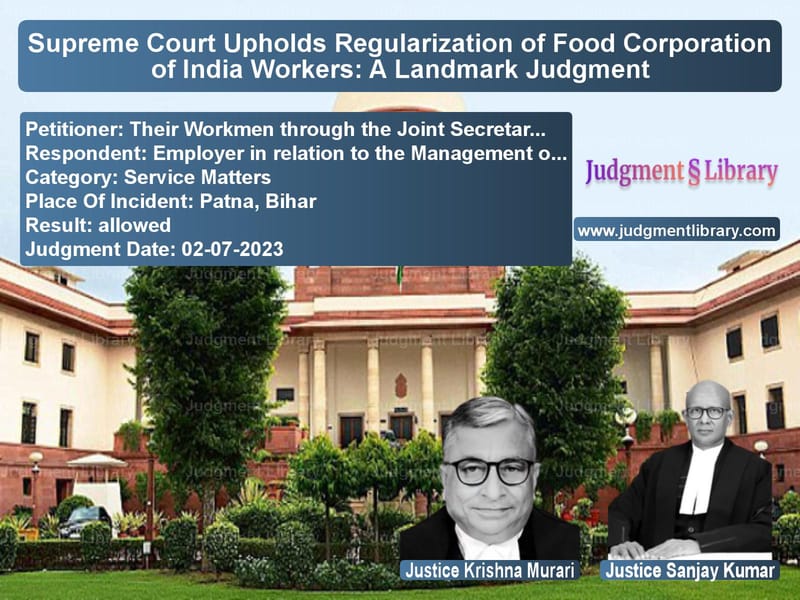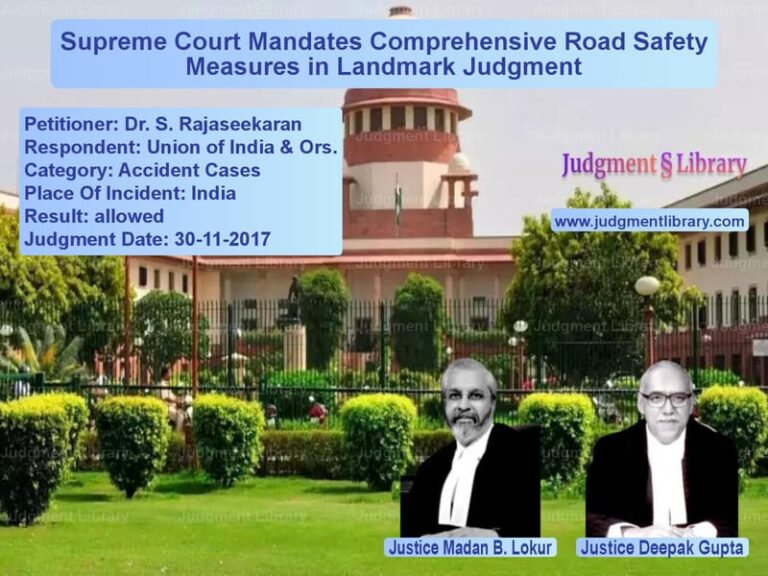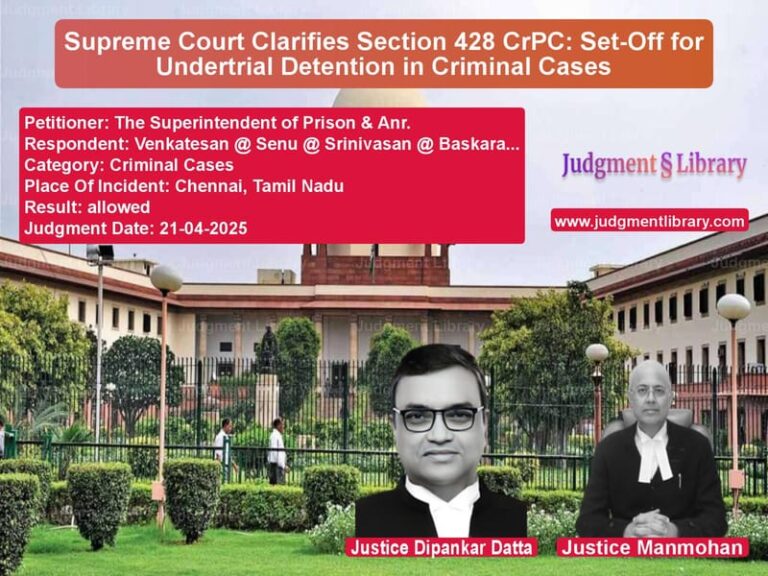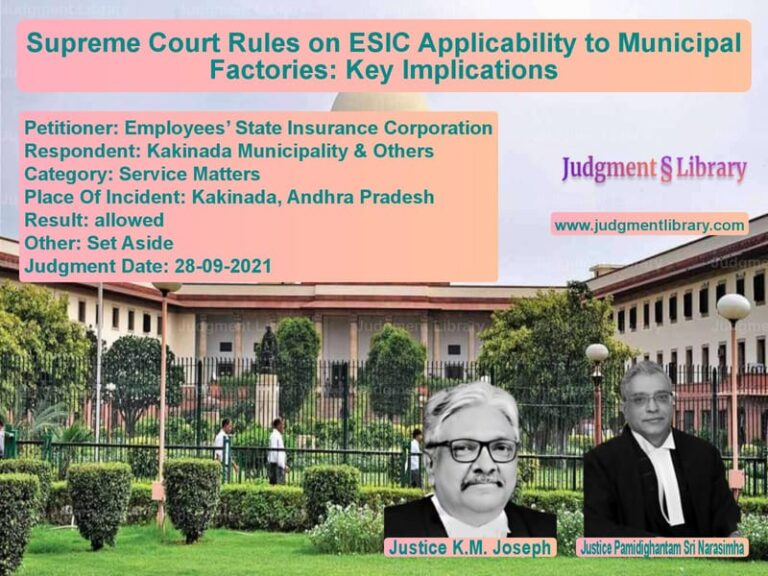Supreme Court Upholds Regularization of Food Corporation of India Workers: A Landmark Judgment
The case of Their Workmen through the Joint Secretary (Welfare), Food Corporation of India Executive Staff Union v. Employer in relation to the Management of the Food Corporation of India & Anr. deals with a long-standing labor dispute concerning the retrenchment and subsequent regularization of 21 casual workers at the Food Corporation of India (FCI). The Supreme Court upheld the reinstatement and regularization of these workers, emphasizing that an employer cannot take advantage of procedural delays to deny workers their rightful status.
Background of the Case
The dispute arose when 21 casual workers of the FCI at Patna were retrenched without being given proper notice or compensation. The workers, represented by the Food Corporation of India Executive Staff Union, approached the authorities seeking reinstatement.
Key Events Leading to Litigation
- January 12, 1996: The Ministry of Labour referred the dispute to the Central Government Industrial Tribunal (CGIT) No. 2, Dhanbad.
- March 18, 1997: The CGIT ruled that the retrenchment was illegal and directed FCI to reinstate the workers with 75% back wages and regularize them in Class-IV posts.
- 1998: FCI challenged the Tribunal’s award in the Jharkhand High Court.
- August 5, 1999: The High Court granted interim relief but required FCI to pay the last drawn wages to the workers.
- November 2000: FCI issued orders implementing the award and absorbing the workers in regular service.
- November 1, 2018: The High Court dismissed FCI’s petition, upholding the Tribunal’s ruling.
- December 17, 2020: The Division Bench of the High Court modified the judgment, quashing the regularization order but maintaining reinstatement.
- July 3, 2023: The Supreme Court ruled in favor of the workers, restoring the Tribunal’s award in full.
Arguments Presented Before the Supreme Court
Workers’ Arguments
The workers, represented by their union, contended that:
- The Tribunal’s order directing reinstatement and regularization was justified, as they had worked for over 240 days in the preceding year before being retrenched.
- FCI had already absorbed them into regular service in 2000, and they had worked for over 18 years as regular employees.
- Reversing their regularization would be unfair, as it would result in significant hardship after decades of employment.
FCI’s Arguments
The Food Corporation of India argued that:
- The Tribunal exceeded its jurisdiction by ordering regularization, as the dispute referred to retrenchment and not permanent employment.
- The workers were only entitled to reinstatement and not automatic regularization.
- The Division Bench of the High Court rightly held that regularization was outside the scope of the reference.
Supreme Court’s Analysis and Judgment
A bench comprising Justices Krishna Murari and Sanjay Kumar examined the case and ruled in favor of the workers, emphasizing the principles of fairness and justice.
Key Observations of the Court
1. Employers Cannot Reverse Absorption After Decades
“The management of FCI voluntarily chose to implement the Award in its totality, despite the conditional interim protection afforded to it in the writ petition.”
The Court criticized FCI’s attempt to undo regularization after allowing the workers to serve as regular employees for 18 years.
2. Tribunal’s Order Was Justified
“The management did not challenge the reinstatement aspect before the Division Bench, and it is now estopped from doing so before this Court.”
The Court held that FCI had accepted reinstatement and could not challenge it at this stage.
3. Workers Had Legitimate Expectations
“Having placed them in that position, it is no longer open to the management of FCI to seek to turn back the clock.”
The Court recognized that workers had built their careers at FCI based on their absorption and could not now be stripped of their rights.
4. The Division Bench’s Ruling Was Flawed
“The High Court failed to consider that the workers had already been absorbed in regular service and had been working for nearly two decades.”
The Court reinstated the Tribunal’s award in full.
Final Ruling
The Supreme Court allowed the workers’ appeal and restored the Tribunal’s award. It also dismissed FCI’s appeal, ensuring that the workers would remain in regular service.
Impact of the Judgment
This ruling has significant implications for labor law and industrial disputes:
- Protects Long-Serving Workers: The judgment prevents employers from using procedural delays to deny workers their rights.
- Strengthens Legal Precedent on Absorption: Employers who voluntarily absorb workers cannot later reverse the decision.
- Limits Employer Challenges: Once an employer implements a court order, it cannot later challenge it on technical grounds.
- Provides Security to Contract Workers: Casual workers with long service can claim legitimate expectations of regularization.
Conclusion
The Supreme Court’s judgment in FCI Workmen v. Management is a landmark ruling for labor rights. It ensures that workers who have been regularized and served for decades cannot be stripped of their employment due to procedural technicalities. The ruling strengthens protections for industrial workers and reinforces the importance of employer accountability in implementing judicial orders.
Petitioner Name: Their Workmen through the Joint Secretary (Welfare), Food Corporation of India Executive Staff Union.Respondent Name: Employer in relation to the Management of the Food Corporation of India & Anr..Judgment By: Justice Krishna Murari, Justice Sanjay Kumar.Place Of Incident: Patna, Bihar.Judgment Date: 02-07-2023.
Don’t miss out on the full details! Download the complete judgment in PDF format below and gain valuable insights instantly!
Download Judgment: their-workmen-throug-vs-employer-in-relation-supreme-court-of-india-judgment-dated-02-07-2023.pdf
Directly Download Judgment: Directly download this Judgment
See all petitions in Employment Disputes
See all petitions in Recruitment Policies
See all petitions in Public Sector Employees
See all petitions in Judgment by Krishna Murari
See all petitions in Judgment by Sanjay Kumar
See all petitions in allowed
See all petitions in supreme court of India judgments July 2023
See all petitions in 2023 judgments
See all posts in Service Matters Category
See all allowed petitions in Service Matters Category
See all Dismissed petitions in Service Matters Category
See all partially allowed petitions in Service Matters Category







